Options
LM2E- export pouch data & pictures of finds from my November, 2013 England metal detecting trip
 lordmarcovan
Posts: 43,816 ✭✭✭✭✭
lordmarcovan
Posts: 43,816 ✭✭✭✭✭
(Slightly OT on the US Coin Forum, perhaps, but since some of the regulars here were donors that helped make the trip possible, I thought I'd post this here.)
Hi, everybody. Sorry I've been rather scarce around the forums these past few months. Went through a bit of a rough patch (a rather deep depression after the trip), but I have since changed jobs (for the better), so things are looking up. I was also involved in a pretty bad car accident around the end of January. (Both vehicles were totaled, but both drivers walked away. The airbags saved my life. I had some pretty spectacular bruises, but they've just about faded now).
I hope I can get back into the numismatic swing of things and rejoin y'all here eventually. Sold some of my coins to make that trip, so I intend to work a bit on my collection this year, now that I have a (slightly) better paying job.
Here's the data from my export pouch from the November 1-7, 2013 detecting trip to the Colchester area in Essex, UK. (Though the application says "October").
These are my live "field reports" posted on the forums at the time. (rather "quick n' dirty", since I had only a tiny Android tablet with me).
This is the November, 2013 finds page from the club website.
You can see my Edward I and Charles I pennies as well as my medieval trade weight, if you scroll down far enough on that club page. The Marcus Aurelius sestertius was found by another digger within an hour of my first outing. The gold thimble was found on the day I stayed in the barn after my detector failed. The gold quarter-noble and last few Celtic gold pieces were found within a day or two after my departure.
The majority of the "Post-Tudor buttons" in the last two pictures were found by other diggers on the trip and were destined for the scrap bin. I thought it a shame to throw away historical relics like that, even such modest ones, and figured they might make fun giveaways later if anybody here wants some. So the other diggers "donated" some of their "scrap" finds to me to put into my pouch.
Unbeknownst to anyone, it appears there were two coins or tokens mixed in with the donated "scrap" buttons, and I have no idea what they are! You can see them in grids #12 and 13 in the fifth picture. Looks like they're pretty bent up. They're obviously old, and look pretty thin- apparently hammered pieces. (Jetons, maybe? We'll see.) The other two copper coins to the left of them are the ones I personally found- a 1730 George II farthing and a 1916 George V halfpenny.
I also deliberately saved one piece of 20th century scrap metal (that piece of WW2 shrapnel) because I had a hunch it was a relic of the Battle of Britain, and WW2 history interests me. To think that was probably fired from a British AA gun at a Luftwaffe bomber in 1940- pretty fascinating, eh?
There's no physical sign of the finds here, yet. It's obviously a glacially slow process, but hey, that's all right. The export license has been applied for, so eventually I will have the goodies on this side of the pond.
It'll likely be months yet before I can edit the hours of video I shot (most of which isn't that great) into something resembling a 30-minute to 1-hour movie.
Thank you all again for your wonderful support in sending me on this trip. I checked a really big one off the "bucket list"- something I wasn't sure I'd ever be able to do.
No, I didn't get anything supremely valuable, and that gold coin eluded me. (Some of the other guys did find some, including that gold quarter-noble, within a day or two after I left). But it was literally the "adventure of a lifetime" for me, and I'll cherish those two hammered silver pennies I dug for the rest of my days. (I never sell my dug coins.) In monetary terms, the value of my finds, when weighed against the cost of the trip (both to the donors and a couple grand of my own money) means it was not a profitable venture. But do I care a bit about that? Nope! In terms of adventure and fun, was all the expense, physical hardship, and travel worth it? YOU BET IT WAS!
~RWS
<< <i>Robertson Shinnick Export Ref RSOct2013
675 Georgetown Rd
Brunswick
Georgia
31523 USA
Metal detecting finds for export found Oct 2013. Location East of Colchester.
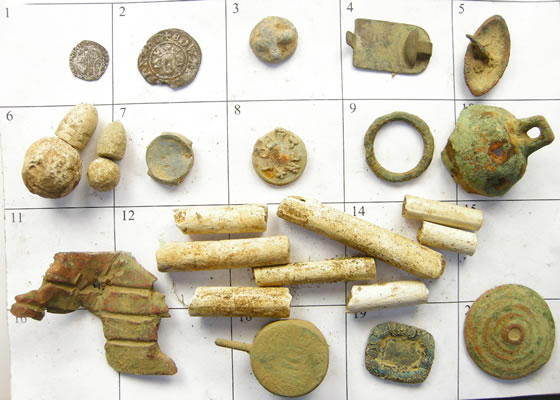
1. 1641-3 Charles 1st hammered silver penny - mintmark 2 dots
2. 1300-1310 Edward Ist hammered silver penny - Closed E, outcurving h- Cross pattee - Crown 1 - Type 10 cf3 Obv +EDWAR ANGL DNS hYB Rev CIVI/TAS/LON/DON - London mint
3. Medieval trade weight
4.18thC clog fastener
5. 1500-1700 mount
6. 4 lead musket balls/shot
7. Post medieval lead bale seal
8. Post medieval lead alnage cloth seal
9. Post medieval harness ring
10. 18thC crotal bell
11. WWII AA flack shell fragment
12. 8 clay pipe stems
18. 19thC Rim fire cartridge cap
19. Georgian mount
20. Georgian draw pull back plate
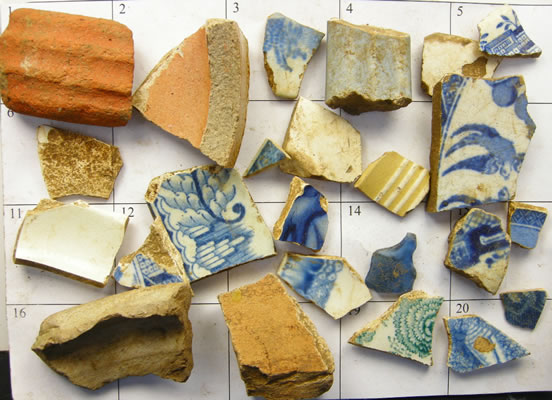
25 Post Tudor glass and pottery shards
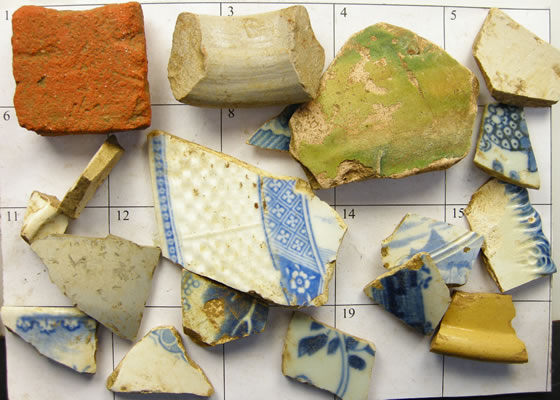
17 Post Tudor glass and pottery shards
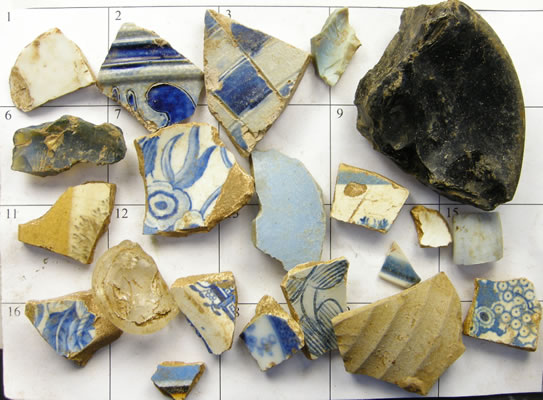
21 Post Tudor glass and pottery shards
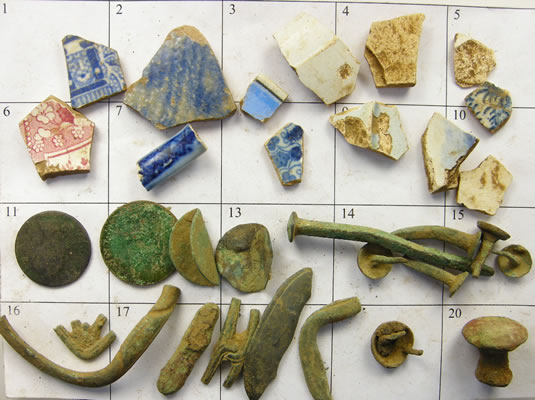
1. 13 Post Tudor glass and pottery shards
11. 4- 18tht to 20thC copper coins
14. 6 nails/tacks
16. 6 buckle fragments
19. 1500-1700 mount
20. Georgian draw pull
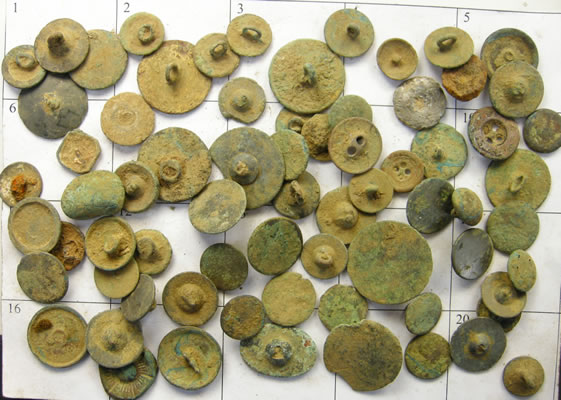
70 Post Tudor buttons
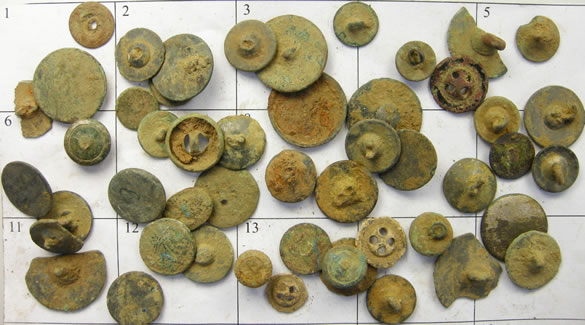
54 Post Tudor buttons
C.Meitiner
01206 231962 >>
Hi, everybody. Sorry I've been rather scarce around the forums these past few months. Went through a bit of a rough patch (a rather deep depression after the trip), but I have since changed jobs (for the better), so things are looking up. I was also involved in a pretty bad car accident around the end of January. (Both vehicles were totaled, but both drivers walked away. The airbags saved my life. I had some pretty spectacular bruises, but they've just about faded now).
I hope I can get back into the numismatic swing of things and rejoin y'all here eventually. Sold some of my coins to make that trip, so I intend to work a bit on my collection this year, now that I have a (slightly) better paying job.
Here's the data from my export pouch from the November 1-7, 2013 detecting trip to the Colchester area in Essex, UK. (Though the application says "October").
These are my live "field reports" posted on the forums at the time. (rather "quick n' dirty", since I had only a tiny Android tablet with me).
This is the November, 2013 finds page from the club website.
You can see my Edward I and Charles I pennies as well as my medieval trade weight, if you scroll down far enough on that club page. The Marcus Aurelius sestertius was found by another digger within an hour of my first outing. The gold thimble was found on the day I stayed in the barn after my detector failed. The gold quarter-noble and last few Celtic gold pieces were found within a day or two after my departure.
The majority of the "Post-Tudor buttons" in the last two pictures were found by other diggers on the trip and were destined for the scrap bin. I thought it a shame to throw away historical relics like that, even such modest ones, and figured they might make fun giveaways later if anybody here wants some. So the other diggers "donated" some of their "scrap" finds to me to put into my pouch.
Unbeknownst to anyone, it appears there were two coins or tokens mixed in with the donated "scrap" buttons, and I have no idea what they are! You can see them in grids #12 and 13 in the fifth picture. Looks like they're pretty bent up. They're obviously old, and look pretty thin- apparently hammered pieces. (Jetons, maybe? We'll see.) The other two copper coins to the left of them are the ones I personally found- a 1730 George II farthing and a 1916 George V halfpenny.
I also deliberately saved one piece of 20th century scrap metal (that piece of WW2 shrapnel) because I had a hunch it was a relic of the Battle of Britain, and WW2 history interests me. To think that was probably fired from a British AA gun at a Luftwaffe bomber in 1940- pretty fascinating, eh?
There's no physical sign of the finds here, yet. It's obviously a glacially slow process, but hey, that's all right. The export license has been applied for, so eventually I will have the goodies on this side of the pond.
It'll likely be months yet before I can edit the hours of video I shot (most of which isn't that great) into something resembling a 30-minute to 1-hour movie.
Thank you all again for your wonderful support in sending me on this trip. I checked a really big one off the "bucket list"- something I wasn't sure I'd ever be able to do.
No, I didn't get anything supremely valuable, and that gold coin eluded me. (Some of the other guys did find some, including that gold quarter-noble, within a day or two after I left). But it was literally the "adventure of a lifetime" for me, and I'll cherish those two hammered silver pennies I dug for the rest of my days. (I never sell my dug coins.) In monetary terms, the value of my finds, when weighed against the cost of the trip (both to the donors and a couple grand of my own money) means it was not a profitable venture. But do I care a bit about that? Nope! In terms of adventure and fun, was all the expense, physical hardship, and travel worth it? YOU BET IT WAS!
~RWS
<< <i>Robertson Shinnick Export Ref RSOct2013
675 Georgetown Rd
Brunswick
Georgia
31523 USA
Metal detecting finds for export found Oct 2013. Location East of Colchester.

1. 1641-3 Charles 1st hammered silver penny - mintmark 2 dots
2. 1300-1310 Edward Ist hammered silver penny - Closed E, outcurving h- Cross pattee - Crown 1 - Type 10 cf3 Obv +EDWAR ANGL DNS hYB Rev CIVI/TAS/LON/DON - London mint
3. Medieval trade weight
4.18thC clog fastener
5. 1500-1700 mount
6. 4 lead musket balls/shot
7. Post medieval lead bale seal
8. Post medieval lead alnage cloth seal
9. Post medieval harness ring
10. 18thC crotal bell
11. WWII AA flack shell fragment
12. 8 clay pipe stems
18. 19thC Rim fire cartridge cap
19. Georgian mount
20. Georgian draw pull back plate

25 Post Tudor glass and pottery shards

17 Post Tudor glass and pottery shards

21 Post Tudor glass and pottery shards

1. 13 Post Tudor glass and pottery shards
11. 4- 18tht to 20thC copper coins
14. 6 nails/tacks
16. 6 buckle fragments
19. 1500-1700 mount
20. Georgian draw pull

70 Post Tudor buttons

54 Post Tudor buttons
C.Meitiner
01206 231962 >>
0

Comments
"Welcome back"
And happy to look over your export pouch.
Best wishes,
Eric
<< <i>That shell base or cartridge case is a pinfire, not a rimfire. >>
Yep. Mr. Meitner made a few other minor errors in nomenclature. I just posted the text of the export application verbatim.
<< <i>
+1
.
<< <i>Sounds like a great trip, Lord M. Good to hear from you. You know, you can date your pipestems by measuring the bore diameter with drill bits. Largest bores are early 17thc and they get smaller after that. Amongst your pottery I see some shell edged pearlware and Rhenish stoneware (can't help it, former archaeologist). Lots of neat stuff and those early coins have an amazing amount of detail. >>
I'm familiar with some of those 18th century pottery types (not to mention the flat buttons) from our colonial sites here in GA. I knew about the pipestem measuring method (whatzit called, the Binford technique?) from Ivor Noel Hume's Artifacts of Colonial America. I've long fancied myself a (very amateur) archaeolgist, albeit one without any formal education- just a few books. Never thought about measuring the pipestem bores before, because all of the ones I find here tend to be late 18th/early 19th century. But now that you mention it, the ones I found in England might have a bit more dating variety!
PS- speaking of clay pipes, though I haven't been digging since the England trip (my detector died over there, slain by the English rain), I eyeballed a Rev War- era pipe bowl fragment on a site I was walking just the other day.
Successful BST deals with mustangt and jesbroken. Now EVERYTHING is for sale.
Here's a warning parable for coin collectors...
Looking for Top Pop Mercury Dime Varieties & High Grade Mercury Dime Toners.
<< <i>It all looks like treasure to me. >>
Ditto. Welcome back buddy. Sorry to hear about the MVA and glad you're ok.
Too many positive BST transactions with too many members to list.